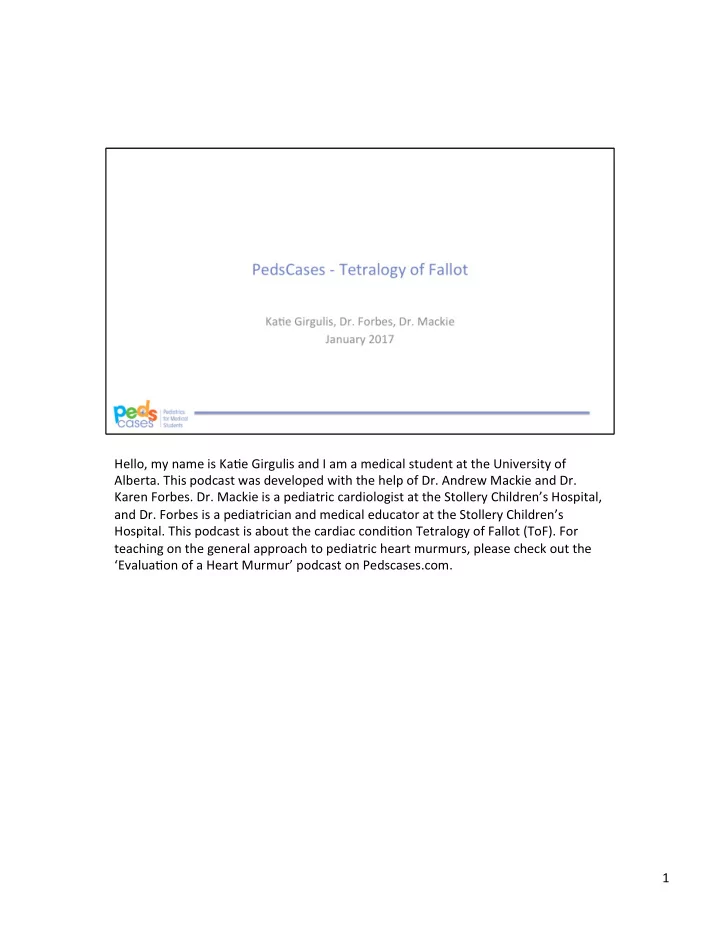

Hello, ¡my ¡name ¡is ¡Ka.e ¡Girgulis ¡and ¡I ¡am ¡a ¡medical ¡student ¡at ¡the ¡University ¡of ¡ Alberta. ¡This ¡podcast ¡was ¡developed ¡with ¡the ¡help ¡of ¡Dr. ¡Andrew ¡Mackie ¡and ¡Dr. ¡ Karen ¡Forbes. ¡Dr. ¡Mackie ¡is ¡a ¡pediatric ¡cardiologist ¡at ¡the ¡Stollery ¡Children’s ¡Hospital, ¡ and ¡Dr. ¡Forbes ¡is ¡a ¡pediatrician ¡and ¡medical ¡educator ¡at ¡the ¡Stollery ¡Children’s ¡ Hospital. ¡This ¡podcast ¡is ¡about ¡the ¡cardiac ¡condi.on ¡Tetralogy ¡of ¡Fallot ¡(ToF). ¡For ¡ teaching ¡on ¡the ¡general ¡approach ¡to ¡pediatric ¡heart ¡murmurs, ¡please ¡check ¡out ¡the ¡ ‘Evalua.on ¡of ¡a ¡Heart ¡Murmur’ ¡podcast ¡on ¡Pedscases.com. ¡ ¡ 1 ¡
Learning ¡Objec.ves ¡ By ¡the ¡end ¡of ¡this ¡podcast, ¡the ¡learner ¡will ¡be ¡able ¡to: ¡ Recognize ¡the ¡clinical ¡presenta.ons ¡of ¡ToF ¡ Describe ¡the ¡four ¡anatomical ¡characteris.cs ¡of ¡ToF ¡ Describe ¡the ¡pathophysiology ¡of ¡the ¡murmur ¡in ¡ToF ¡ Formulate ¡ini.al ¡steps ¡when ¡ToF ¡is ¡suspected ¡ Delineate ¡the ¡treatment ¡of ¡hypercyano.c ¡episodes ¡ Summarize ¡the ¡defini.ve ¡treatment ¡for ¡ToF ¡ ¡ 2 ¡
Case ¡– ¡Baby ¡Josh ¡ Let’s ¡start ¡with ¡a ¡clinical ¡case: ¡You ¡are ¡working ¡with ¡Dr. ¡Smith, ¡a ¡family ¡physician, ¡ during ¡your ¡family ¡medicine ¡rota.on. ¡Josh ¡is ¡a ¡4-‑month-‑old ¡infant ¡who ¡is ¡here ¡for ¡a ¡ well-‑baby ¡check. ¡Dr. ¡Smith ¡encourages ¡you ¡to ¡start ¡the ¡history ¡and ¡physical ¡exam ¡on ¡ your ¡own ¡before ¡she ¡joins ¡you ¡in ¡the ¡room. ¡All ¡is ¡going ¡well ¡un.l ¡you ¡no.ce ¡a ¡murmur ¡ while ¡ausculta.ng ¡Josh’s ¡chest. ¡Oh ¡no! ¡You ¡are ¡struggling ¡to ¡remember ¡cardiology ¡ and ¡murmurs. ¡Let’s ¡quickly ¡remind ¡ourselves ¡of ¡some ¡key ¡points ¡about ¡heart ¡ murmurs. ¡ ¡ 3 ¡
Brief ¡Review ¡of ¡Innocent ¡vs. ¡Pathologic ¡Murmurs ¡ Before ¡ge`ng ¡into ¡the ¡details ¡of ¡the ¡case, ¡let’s ¡do ¡a ¡brief ¡review ¡of ¡how ¡we ¡dis.nguish ¡innocent ¡murmurs ¡from ¡ pathological ¡ones. ¡A ¡good ¡mnemonic ¡for ¡features ¡of ¡innocent ¡murmurs ¡is ¡the ¡“Seven ¡S’s”: ¡ sensi%ve, ¡short, ¡single, ¡ small, ¡so1, ¡sweet, ¡and ¡systolic. ¡I ¡will ¡explain ¡each ¡of ¡these ¡briefly: ¡ ¡ Sensi.ve ¡-‑ ¡the ¡murmur ¡changes ¡with ¡posi.on ¡or ¡respira.on ¡ Short ¡dura.on ¡-‑ ¡the ¡murmur ¡is ¡not ¡pansystolic ¡ Single ¡-‑ ¡there ¡are ¡no ¡clicks ¡or ¡gallops ¡ Small ¡-‑ ¡the ¡murmur ¡is ¡limited ¡to ¡a ¡small ¡area ¡and ¡is ¡non-‑radia.ng ¡ Sod ¡-‑ ¡the ¡murmur ¡if ¡of ¡low ¡intensity ¡ Sweet ¡-‑ ¡the ¡murmur ¡is ¡not ¡harsh ¡in ¡quality ¡ Systolic ¡-‑ ¡the ¡murmur ¡is ¡limited ¡to ¡systole. ¡Remember: ¡diastolic ¡and ¡pansystolic ¡murmurs ¡are ¡always ¡pathological, ¡ whereas ¡systolic ¡ejec.on ¡murmurs ¡may ¡or ¡may ¡not ¡be ¡pathological ¡ 4 ¡
In ¡addi.on ¡to ¡the ¡features ¡of ¡the ¡murmur ¡on ¡ausculta.on, ¡we ¡need ¡to ¡look ¡for ¡symptoms ¡and ¡signs ¡on ¡history ¡and ¡ physical ¡exam, ¡such ¡as ¡the ¡following, ¡that ¡would ¡raise ¡concern ¡for ¡a ¡pathological ¡murmur: ¡ respiratory ¡difficul.es ¡ cyanosis ¡ poor ¡feeding ¡ poor ¡growth ¡ syncope ¡ family ¡history ¡of ¡congenital ¡heart ¡disease ¡or ¡sudden ¡cardiac ¡death ¡ abnormal ¡vital ¡signs ¡ diminished ¡or ¡absent ¡femoral ¡pulses ¡ diastolic ¡or ¡pansystolic ¡murmur ¡ ¡ high ¡intensity ¡murmur ¡(grade ¡≥ ¡3) ¡ increased ¡murmur ¡intensity ¡when ¡the ¡child ¡is ¡in ¡an ¡upright ¡posi.on ¡ harsh ¡quality ¡of ¡the ¡murmur ¡ abnormal ¡S2 ¡(i.e. ¡not ¡physiologically ¡split) ¡ extra ¡heart ¡sounds ¡(such ¡as ¡clicks ¡or ¡gallops) ¡ Now, ¡back ¡to ¡the ¡case ¡ Dr. ¡Smith ¡enters ¡the ¡room ¡and ¡asks ¡you ¡for ¡a ¡brief ¡presenta.on ¡about ¡Josh. ¡ ¡ From ¡the ¡history, ¡you ¡learned ¡that ¡Josh’ ¡parents ¡have ¡no ¡big ¡concerns. ¡However, ¡they ¡have ¡no.ced ¡that ¡he ¡seems ¡ to ¡turn ¡blue ¡in ¡the ¡lips ¡when ¡crying ¡very ¡hard. ¡These ¡episodes ¡resolve ¡spontaneously ¡but ¡are ¡occurring ¡every ¡few ¡ days. ¡Josh ¡is ¡their ¡fourth ¡child. ¡It ¡was ¡an ¡uncomplicated ¡pregnancy ¡with ¡rou.ne ¡prenatal ¡care. ¡He ¡was ¡born ¡one ¡ week ¡later ¡than ¡his ¡due ¡date ¡from ¡an ¡induced ¡vaginal ¡delivery. ¡He ¡breasheeds ¡every ¡3 ¡hours, ¡generally ¡well, ¡but ¡ some.mes ¡takes ¡a ¡long ¡.me ¡to ¡feed. ¡Josh’s ¡parents ¡report ¡that ¡he ¡was ¡a ¡small ¡baby ¡(born ¡at ¡the ¡10 th ¡percen.le), ¡ but ¡is ¡tracking ¡along ¡his ¡length ¡and ¡weight ¡growth ¡curves. ¡His ¡immuniza.ons ¡are ¡up ¡to ¡date. ¡ ¡ ¡ 5 ¡
Thus, ¡the ¡main ¡finding ¡from ¡the ¡history ¡is ¡central ¡cyanosis ¡-‑ ¡Josh’s ¡parents ¡described ¡ this ¡as ¡turning ¡blue ¡around ¡the ¡lips. ¡Central ¡cyanosis ¡is ¡concerning, ¡as ¡it ¡suggests ¡that ¡ deoxygenated ¡blood ¡is ¡being ¡pumped ¡from ¡the ¡heart ¡into ¡circula.on ¡– ¡somehow ¡the ¡ blood ¡is ¡not ¡ge`ng ¡fully ¡oxygenated ¡in ¡the ¡lungs. ¡Feeding ¡problems ¡in ¡an ¡infant ¡ should ¡also ¡raise ¡alarm, ¡par.cularly ¡if ¡there ¡is ¡a ¡history ¡of ¡prolonged ¡feeding, ¡ diaphoresis ¡with ¡feeding, ¡or ¡an ¡infant ¡needing ¡to ¡stop ¡frequently ¡to ¡catch ¡their ¡ breath ¡while ¡feeding. ¡These ¡may ¡be ¡indica.ve ¡of ¡conges.ve ¡heart ¡failure, ¡with ¡ pulmonary ¡over-‑circula.on, ¡leading ¡to ¡shortness ¡of ¡breath ¡and ¡tachypnea. ¡Or, ¡it ¡ could ¡be ¡associated ¡with ¡lower ¡oxygen ¡satura.on ¡of ¡the ¡blood ¡and ¡therefore ¡reduced ¡ exercise ¡tolerance. ¡It ¡is ¡useful ¡to ¡think ¡about ¡feeding ¡as ¡an ¡infant’s ¡form ¡of ¡‘exercise’. ¡ ¡ ¡ Let’s ¡move ¡onto ¡the ¡physical ¡exam. ¡You ¡and ¡Dr. ¡Smith ¡work ¡together ¡to ¡examine ¡ Josh, ¡and ¡your ¡findings ¡are ¡as ¡follows: ¡ ¡ 6 ¡
Josh ¡is ¡content ¡and ¡well-‑appearing. ¡His ¡vital ¡signs ¡are ¡normal ¡other ¡than ¡a ¡low ¡oxygen ¡ satura.on ¡of ¡81%. ¡There ¡is ¡a ¡grade ¡3/6 ¡harsh ¡systolic ¡crescendo-‑decrescendo ¡ murmur ¡heard ¡best ¡along ¡the ¡led ¡sternal ¡border. ¡The ¡murmur ¡radiates ¡to ¡the ¡axillae ¡ and ¡back. ¡The ¡examina.on ¡of ¡all ¡other ¡systems ¡is ¡normal. ¡ ¡ ¡ ¡ Altogether, ¡Josh’s ¡associated ¡symptoms ¡(cyano.c ¡episodes) ¡and ¡abnormal ¡vital ¡signs ¡ (low ¡O2 ¡satura.on), ¡as ¡well ¡as ¡features ¡of ¡the ¡murmur ¡(harsh ¡quality, ¡high ¡intensity, ¡ large ¡radia.on) ¡should ¡point ¡you ¡towards ¡a ¡pathological ¡murmur ¡rather ¡than ¡an ¡ innocent ¡murmur. ¡In ¡fact, ¡what ¡has ¡been ¡described ¡is ¡a ¡common ¡presenta.on ¡of ¡ Tetralogy ¡of ¡Fallot ¡(ToF). ¡ ¡ 7 ¡
Recommend
More recommend